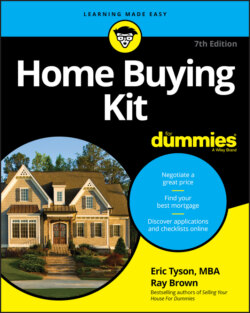Читать книгу Home Buying Kit For Dummies - Eric Tyson - Страница 47
WILLS, LIVING TRUSTS, AND ESTATE PLANNING
ОглавлениеAlthough some of us don’t like to admit it or even think about it, we’re all mortal. Because of the way our legal and tax systems work, it’s often beneficial to have legal documents in place specifying important details such as what should be done with your assets (including your home) when you die.
A will is the most basic of such documents, and for most people, particularly those who are younger or don’t have great assets, the only critical one. Through a will, you can direct to whom your assets will go upon your death, as well as who will serve as guardian for your minor children. In the absence of a will, state law dictates these important issues.
Along with your will, also consider signing a living will and a medical power of attorney. These documents help your doctor and family members make important decisions regarding your healthcare, should you be unable to make those decisions for yourself.
Even a will and supporting medical and legal documents may not be enough to get your assets to your desired heirs, as well as minimize taxes and legal fees. When you hold significant assets (such as a home and business) outside tax-sheltered retirement accounts, in most states, those assets must be probated — which is the court-administered process for implementing your will. Attorneys’ probate fees can run quite high — up to 5 percent of the value of the probated assets. Establishing and placing your home and other assets in a living trust can eliminate much of the hassle and cost of probate.
Finally, if your net worth (assets minus liabilities) exceeds $11.58 million, under current tax law, upon your death the federal (and perhaps your state’s) government will levy significant estate taxes (numerous states have far lower limits). Estate planning can help minimize the portion of your estate subject to such taxation. One simple but powerful estate-planning strategy is to give money to your desired heirs to reduce your taxable estate. (If your relatives are in the fortunate position of having great wealth, they may give, free of tax, up to $15,000 yearly under current tax law to as many recipients as they want. If they give you $15,000, you can use this money toward your home’s down payment.)
Wills, living trusts, and estate planning are nothing more than forms of insurance. Remember that it takes both time and money to generate these documents, and the benefits may be a long time off, so don’t get carried away with doing too many of these things before you’re older and have significant assets. Read the latest edition of Personal Finance After 50 For Dummies (Wiley), which Eric coauthored with Bob Carlson, to find out more about estate planning. Eric also enthusiastically recommends Ray’s excellent book, Winning the Endgame: A Guide to Aging Wisely and Dying Well.
With all types of insurance that you purchase, take the highest deductible that you can comfortably afford. The deductible represents the amount of money that you must pay out of your own pocket when you have a loss for which you file a claim. High deductibles help keep the cost of your coverage low and also eliminate the hassle associated with filing small claims.
Along with buying insurance to cover the replacement costs for loss of or damage to your valuable assets, you should purchase adequate liability insurance for those assets. Both homeowners insurance and auto insurance come with liability protection. Make sure that you carry liability coverage for at least twice the value of your net worth (assets minus liabilities).
In addition to the liability protection that comes with auto and homeowners insurance, you may purchase a supplemental liability insurance policy known as an umbrella or excess liability policy. Purchased in increments of $1,000,000, this coverage can protect people with larger net worth. Note that this coverage doesn’t protect against lawsuits arising from your work.
